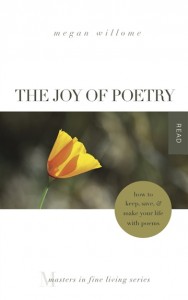A few weeks ago, Megan Willome sent me her new book The Joy of Poetry. I loved it, and I hope you will read it, too.
As I read her book, I found myself reflecting on the role poetry has played in my life. That was natural, since the book tracks Megan’s own entanglements with poetry, interwoven with the earthy story of her mother’s death of cancer.
In the book, Megan includes dozens of poems by herself and others. Only one of them is identified as “bad.” And … that one bad poem is mine.
I suppose that I should feel terrible that my poem — my first published poem! — was the bad example used in a book about poetry, but I don’t. That’s because the poem she uses (which first appeared on my blog on January 18, 2013) was supposed to be bad; it was the exemplar for a bad poetry contest. If you are wondering, here is the text:
There’s no need to cry
The clouds do it for me
Expressing my depression better
Than I ever could.
As a kid, I think I only wrote one poem. It was for class, and it was (for reasons I can’t remember) about George Washington and Valley Forge. I gave it to my grandmother, and my Aunt Betsy recently gave it back to me. Generally, I was unimpressed by poetry and those who called themselves “poets, ” including one girl in my class who appropriated wholesale the lyrics to “Landslide” by Fleetwood Mac.
That changed in college. I signed up for an African-American literature class. The professor was Joanne Braxton, who was described to me by a fellow student as “an actual poet, ” a fact she proved up by producing Braxton’s book Sometimes I Think of Maryland.
I was skeptical. Once the class began, everything changed, though. She wasn’t a poet because she had published poetry; she was a poet because her words were well-considered, strong, worthy of our time. A question would be asked, and she would pause, nodding a little. We waited anxiously, and then the answer would come out in a way I had never heard. Her responses had an architecture to them; they weren’t said so much as constructed. Many people found her intimidating. I found her fascinating (though she found me less impressive — I got a well-deserved “B” in her class). I resolved not to be a poet, but simply to have some poetry in me; I wanted a bit of that soaring architecture in what I said and wrote.
It was a tall order for a 20-year-old, and my efforts were just terrible, I’m sure. Sadly, unless you have some wisdom — and I did not — trying to sound poetic can come off as pretty damn pretentious.
I have kept that with me, though. No one will ever describe me as a poet, and I would never describe myself that way. Certainly, I know some great poets. For the past years, I hope every Friday that Renee Emerson or Megan Willome will post a haiku. Most recently, Reginald Dwayne Betts has been a great person to follow and read. When I pick his book off the shelf in a bookstore and see my name on the back (I have a blurb), it is thrilling. And Prof. Braxton is still in my life, 30 years later, a blessing.
I’ve never known quite what to do with my own writing that falls outside of what people expect from a law professor. Recently, I was submitting a short story. The publication asked that submissions be accompanied by a short bio, and I really struggled with that. My first effort listed things I have actually done, but they all seemed kind of irrelevant. Next, I just tried one line: This is my first short story. That didn’t seem right, either, so instead I just did the whole thing under a pseudonym. I’ve published a surprising number of things that way.
Mostly, though, I still hold Prof. Braxton’s example before me. When I write or speak about something like clemency, I try to have at least an echo of what I heard all those years ago: a word or phrase that can mean more than the shape it takes as it lies on a page.
I’m not a poet, but my life can have poetry. Thanks for affirming that, Megan Willome.
Browse more Journey into Poetry stories
Photo by Davide D’Amico, Creative Commons, via Flickr. Post by Mark Osler, Robert & Marion Short Distinguished Chair of the School of Law, University of St. Thomas, Minneapolis. Visit him at his personal website, Osler’s Razor.
__________________________
Megan Willome’s The Joy of Poetry—part memoir, part poetry reflections, part anthology—takes readers on a journey to discovering poetry’s purpose, which is, delightfully, nothing. “Why poetry?” Willome asks. “You might as well ask, why chocolate?” Poetry reflects nothing more and nothing less than the pure joy of living, loving, and being, in all of its confusion and wonder. Willome’s book will gently guide you to read, write, and be a little more human through language’s mystery and joy.
—Tania Runyan, author of How to Read a Poem: Based on the Billy Collins Poem “Introduction to Poetry”
- Journey into Poetry: Mark Osler - August 26, 2016


Charity Singleton Craig says
I love this story of Mark’s journey into poetry. Not many are poets, but we can all make space for more poetry in our lives.
Laura (L.L.) Barkat says
This, I love:
“She wasn’t a poet because she had published poetry; she was a poet because her words were well-considered, strong, worthy of our time.”
It should become a standard definition for “poet,” perhaps.
Bethany says
Love this: “I wanted a bit of that soaring architecture in what I said and wrote.”
Jody Collins says
Mark, how refreshing to read the back story of the ‘bad poem’ in Megan’s “The Joy of Poetry”. I will echo the thoughts above–striving to speak and write in a way that is well-constructed and thought out–like architecture–that is a life-long aspiration indeed.
Katie says
Mark,
I learned a great deal from your thoughtful Journey Into Poetry Post.
Following your link for Joanne Braxton’s book to Amazon, I noticed that there is not yet a review of her collection. Maybe you could be the first – ?
Gratefully,
Katie